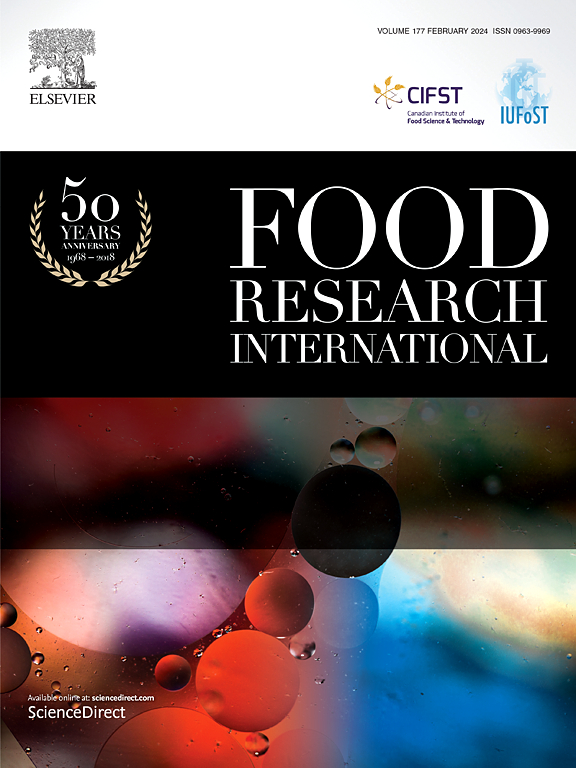Planetary health diet and cognitive decline in Chinese older adults: Balancing health benefits and environmental sustainability
IF 7
1区 农林科学
Q1 FOOD SCIENCE & TECHNOLOGY
引用次数: 0
Abstract
The planetary health diet (PHD) proposed by the EAT-Lancet Commission, advocates for reduced meat and dairy intake while emphasizing the consumption of whole grains, fruits, vegetables, nuts, and legumes. Existing studies have shown that the PHD can lower mortality rates and slow cognitive decline in various populations. However, its specific effects on cognitive impairment among elderly individuals in China remain unclear, primarily due to regional socioeconomic and cultural differences. This study utilizes data from the Chinese Longitudinal Healthy Longevity Survey (CLHLS) to create the animal diet index (ADI) and the planetary health diet index (PHDI). We employed multivariable Cox proportional hazards regression models to assess the associations between these dietary indices and the risk of cognitive impairment in elderly participants. The research also examines the impact of grain intake and its relationship with environmental indicators, including greenhouse gas emissions, water footprint, and land use. Our results reveal that a higher PHDI is significantly correlated with a lower risk of cognitive impairment (HR = 0.539), while a higher ADI is associated with an increased risk (HR = 1.379). Furthermore, increased grain intake is associated with reduced cognitive impairment (HR = 0.729). Notably, the PHDI is linked to greater environmental burdens, contrasting with the ADI's association with lower grain-related environmental impacts. Stratified analyses indicate the PHD is protective across most regions, while the risks associated with animal-based diets are consistent. These findings suggest that while adherence to the PHD and increased grain intake may enhance cognitive health, they may also reflect trade-offs with environmental sustainability across China. Consequently, this study informs dietary strategies that aim to balance health and environmental concerns, emphasizing the need for context-specific approaches to dietary transitions.

中国老年人的行星健康饮食和认知能力下降:平衡健康效益和环境可持续性
由EAT-Lancet委员会提出的全球健康饮食(PHD)提倡减少肉类和乳制品的摄入量,同时强调全谷物、水果、蔬菜、坚果和豆类的摄入。现有的研究表明,博士学位可以降低死亡率,减缓各种人群的认知能力下降。然而,它对中国老年人认知障碍的具体影响尚不清楚,主要是由于区域社会经济和文化差异。本研究利用中国健康长寿纵向调查(CLHLS)的数据,建立了动物饮食指数(ADI)和地球健康饮食指数(PHDI)。我们采用多变量Cox比例风险回归模型来评估这些饮食指标与老年参与者认知功能障碍风险之间的关系。该研究还考察了粮食摄入的影响及其与环境指标的关系,包括温室气体排放、水足迹和土地利用。我们的研究结果显示,较高的PHDI与较低的认知障碍风险显著相关(HR = 0.539),而较高的ADI与风险增加相关(HR = 1.379)。此外,增加谷物摄入量与减少认知障碍相关(HR = 0.729)。值得注意的是,PHDI与更大的环境负担有关,而ADI与较低的粮食相关环境影响有关。分层分析表明,饮食在大多数地区都有保护作用,而与动物性饮食相关的风险是一致的。这些发现表明,虽然坚持博士和增加谷物摄入量可能会增强认知健康,但它们也可能反映了中国各地环境可持续性的权衡。因此,这项研究为旨在平衡健康和环境问题的饮食策略提供了信息,强调需要针对具体情况采取饮食转变方法。
本文章由计算机程序翻译,如有差异,请以英文原文为准。
求助全文
约1分钟内获得全文
求助全文
来源期刊

Food Research International
工程技术-食品科技
CiteScore
12.50
自引率
7.40%
发文量
1183
审稿时长
79 days
期刊介绍:
Food Research International serves as a rapid dissemination platform for significant and impactful research in food science, technology, engineering, and nutrition. The journal focuses on publishing novel, high-quality, and high-impact review papers, original research papers, and letters to the editors across various disciplines in the science and technology of food. Additionally, it follows a policy of publishing special issues on topical and emergent subjects in food research or related areas. Selected, peer-reviewed papers from scientific meetings, workshops, and conferences on the science, technology, and engineering of foods are also featured in special issues.
 求助内容:
求助内容: 应助结果提醒方式:
应助结果提醒方式:


